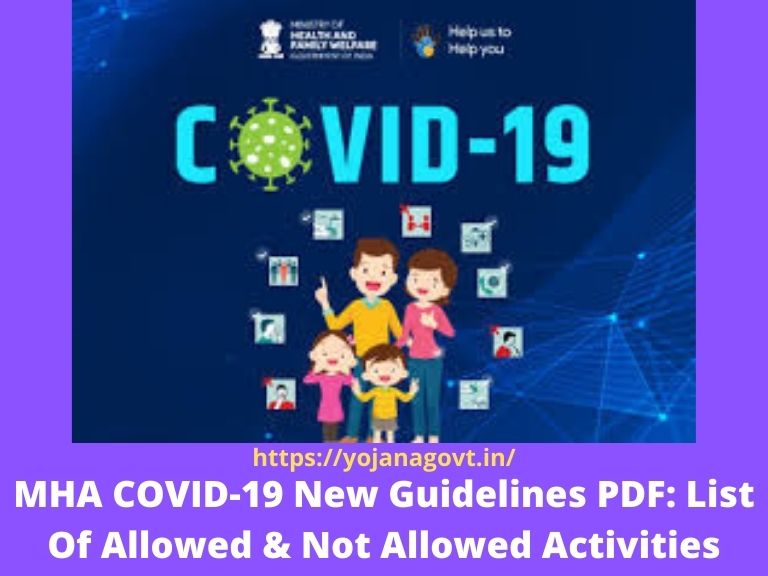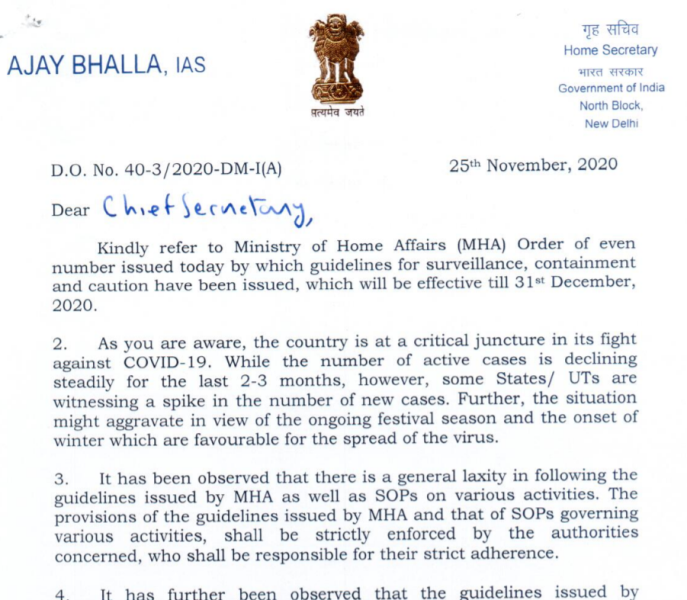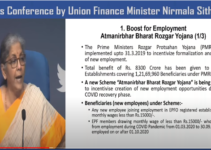MHA COVID-19 New Guidelines PDF | Download MHA COVID-19 New Guidelines Online | Coronavirus MHA Latest Guidelines Details
In this article today, we will share with all of you the details of the new MHA COVID-19 Guidelines PDF which is released by the authorities. We will share with all of you the details of the list of allowed and not allowed activities in the upcoming month of December. The concerned authorities of the Ministry of Health Affairs are launching a new PDF to help the candidates fight the coronavirus disease in the month of December. Make sure to read the article till the last to know all of the new restrictions and civilian and containment zone restrictions followed by the local authorities.

Table of Contents
Details Of MHA Guidelines
| Name | MHA COVID-19 New Guidelines PDF |
| Launched by | Ministry of Health affairs |
| Objective | Providing new guidelines for the spread of coronavirus pandemic |
| Launched for | The citizens of India |
| Official notification | https://www.mha.gov.in |
MHA COVID-19 New Guidelines PDF
The Ministry of Health affairs India has launched new guidelines to prevent the spread of COVID-19. We all know that the spread of coronavirus is not slowing down in our country so that’s why a lot of new guidelines have been issued by the concerned authorities in a PDF manner on 25th November 2020 to help the people fight the coronavirus. There are a lot of new measures which need to be taken care of if the residents want to be safe from the coronavirus pandemic in India. New restrictions have been imposed on the residents and now the union territories and the state government can make their own decisions to prevent the spread of the disease.

COVID Appropriate Behaviour
The applicant must follow the following rules as presented by the Ministry of Health affairs India to contain the spread of covid-19:-
- State/ UT Governments shall take all necessary measures to promote COVID-19 appropriate behaviour.
- Strict enforcement of wearing of face masks, hand hygiene and social distancing must be ensured.
- Wearing of face masks is an essential preventive measure.
- In order to enforce this core requirement, States and UTs may consider administrative actions, including the imposition of appropriate fines, on persons not wearing face masks in public and workspaces.
- Observance of social distancing in crowded places, especially in markets, weekly bazaars and public transport, is also critical for containing the spread of the infection.
- The Ministry of Health and Family Welfare (MoHFW) will issue an SOP to regulate crowds in market places, which shall be strictly enforced by States and UTs.
- SOPs for regulating travel in aircraft, trains and metro rails are already in place, which shall be strictly enforced.
- States and UTs shall issue necessary guidelines for regulating travel in other modes of public transport, e.g., buses, boats etc., and ensure that these are strictly complied with.
- The National Directives for COVID-19 Management, as specified in Annexure I, shall be strictly followed throughout the country.
Surveillance And Containment
The following surveillance and containment measures will be taken by the authorities of states and union territories on their own:-
- Effective demarcation of Containment Zones, invulnerable and high incidence areas, is key to breaking the chain of transmission and controlling the spread of the virus. Containment Zones shall be carefully demarcated by the district authorities, at the micro-level, taking into consideration the guidelines prescribed by the Ministry of Health and Family Welfare (MoHFW) in this regard.
- The list of Containment Zones will be notified on the websites by the respective District Collectors and by the States/ UTs. This list will also be shared with MoHFW.
- Within the demarcated Containment Zones, containment measures, as prescribed by MoHFW, shall be scrupulously followed, as under:
- Only essential activities shall be allowed in the Containment Zones.
- There shall be strict perimeter control to ensure that there is no movement of people in or out of these zones, except for medical emergencies and for maintaining a supply of essential goods and services.
- There shall be intensive house-to-house surveillance by surveillance teams formed for the purpose.
- Testing shall be carried out as per the prescribed protocol.
- Listing of contacts shall be carried out in respect of all persons found positive, along with their tracking, identification, quarantine and follow up of contacts for 14 days (80% of contacts to be traced in 72 hours).
- Quick isolation of COVID-19 patients shall be ensured in treatment facilities/ home ( subject to fulfilling the home isolation guidelines).
- Clinical interventions, as prescribed, shall be administered.
- Surveillance for ILI/ SARI cases shall be carried out in health facilities or outreach mobile units or through fever clinics in buffer zones.
- Awareness shall be created in communities on COVID-19 appropriate behaviour.
- It shall be the responsibility of local district, police and municipal authorities to ensure that the prescribed Containment measures are strictly followed. State/ UT Governments shall ensure the accountability of the officers concerned in this regard.
Permitted And Prohibited Activities
The following duties are prohibited and permitted by the concerned authorities in respect to the prescribed SOPs:-
- All activities have been permitted outside Containment Zones, except for the following, which have been permitted with certain restrictions:
- International air travel of passengers, as permitted by MHA.
- Cinema halls and theatres, with upto 50% capacity.
- Swimming pools, only for training of sports persons.
- Exhibition halls, only for business to business (B2B) purposes.
- Social/ religious/ sports/ entertainment/ educational/ cultural/ religious gatherings, with upto a maximum of 50% of the hall capacity, with a ceiling of 200 persons in closed spaces; and keeping of the size of the ground/ space in view, in open spaces. However, based on their assessment of the situation, State/ UT Governments may reduce the ceiling to 100 persons or less, in closed spaces.
- SOPs have been prescribed for various activities. These include: movement by passenger trains; air travel; metro trains; schools; higher educational institutions; hotels and restaurants; shopping malls, multiplexes and entertainment parks; yoga centres and gymnasiums; assemblies and congregations, etc.
- The SOPs shall be strictly enforced by the authorities concerned, who shall be responsible for their strict observance.
- States and UTs, based on their assessment of the situation, may impose local restrictions, with a view to contain the spread of COVID-19 such as night curfew. However, State/ UT Governments shall not impose any local lockdown (State/ District/ sub-division/City level), outside the containment zones, without prior consultation with the Central Government.
- States and UTs also need to enforce social distancing in offices. In cities, where the weekly Case Positivity Rate is in more than 10%, States and UTs concerned shall consider implementing staggered office timings and other suitable measures, with a view to reduce the number of employees attending office at the same time, thereby ensuring social distancing.
- There shall be no restriction on inter-State and intra-State movement of persons and goods including those for cross land-border trade under
- Treaties with neighbouring countries. No separate permission/ approval/ e-permit will be required for such movements.
- Persons above 65 years of age, persons with co-morbidities, pregnant women, and children below the age of 10 years are advised to stay at home, except for essential and health purposes.
- Aarogya Setu enables early identification of potential risk of infection, and thus acts as a shield for individuals and the community.
- With a view to ensuring safety in offices and workplaces, employers on best effort basis should ensure that Aarogya Setup is installed by all employees having compatible mobile phones.
- Organizations and Business entities with 50 or more employees are encouraged to avail the Aarogya Setu OpenAPI Service
- OpenAPI feature will facilitate Organisations and employees to return to work in a COVID 19 risk free environment.
- District authorities may advise individuals to install the Aarogya Setu application on compatible mobile phones and regularly update their health status on the app. This will facilitate timely provision of medical attention to those individuals who are at risk.
Punishment On Breaking Guidelines
The following punishment will be given to the candidates who are seen breaking the guidelines of the social distancing:-
- State/ UT Governments shall not dilute these guidelines issued under the Disaster Management Act, 2005, in any manner.
- For the enforcement of social distancing, State/ UT Governments may, as far as possible, use the provisions of Section 144 of the Criminal Procedure Code (CrPC) of 1973.
- All the District Magistrates shall strictly enforce the above measures.
- Any person violating these measures will be liable to be proceeded against as per the provisions of Section 51 to 60 of the Disaster Management Act, 2005, besides legal action under Section 88 of the IPC, and other legal provisions as applicable.
Safety Measures
The residents of India must follow the following safety measures to contain the spread of coronavirus pandemic:-
- Face coverings- Wearing of face cover is compulsory in public places; in workplaces; and during transport.
- Social distancing- Individuals must maintain a minimum distance of 6 feet (2 gaz ki doori) in public places.
- Shops will ensure physical distancing among customers.
- Spitting in public places will be punishable with a fine, as may be prescribed by the State/ UT local authority in accordance with its laws, rules or regulations.
- Work from home (WfH)- As far as possible the practice of WFH should be followed.
- Staggering of work/ business hours will be followed in offices, workplaces, shops, markets and industrial & commercial establishments.
- Screening & hygiene- Provision for thermal scanning, hand wash or sanitizer will be made at all entry points and of hand wash or sanitizer at exit points and common areas.
- Frequent sanitization of the entire workplace, common facilities and all points which come into human contact e.g. door handles etc., will be ensured, including between shifts.
- Social distancing- All persons in charge of workplaces will ensure the adequate distance between workers, adequate gaps between shifts, staggering the lunch breaks of staff, etc.
Important Download
- Download MHA COVID-19 Guidelines PDF


